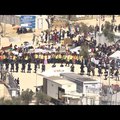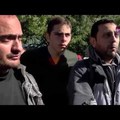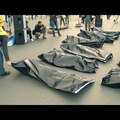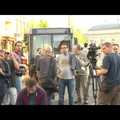The Pope arrived for a quick visit to the frontline of the mass migration towards Europe, Lesbos, on April 16th. The island with a proximity to ancient Troy and a rich history has been a landing site in the past years for hundreds of thousands of refugees primarily from the Middle East, arriving on rafts and dinghies and moving on towards the Western regions of Europe.
However, the Pope’s visit is related to an emerging situation: as a result of the agreement signed between the European Union and Turkey, about 7000 refugees were stuck on Lesbos and the surrounding islands. Another 45000 are in other parts of Greece.
Even though the agreement makes it impossible in theory to illegally cross the border between Turkey and Greece, hundreds of people arrive in scrappy inflatable boats every week on the shores of Lesbos and other territories. As local volunteers have informed us, only 10% of those starting the journey make it to the islands, the others are caught by the NATO forces and the Turkish Coast Guard patrolling the Aegean Sea.
The ones arriving on the shore are taken to a so-called hotspot, a registration camp, surrounded by two sets of barbwire fences. The camp, originally planned for 1500 people is currently inhabited by 2700 refugees in subpar living conditions. The Pope paid his visit to this very camp.
The extradition of the refugees stuck in Greece has started in early April, right from the island of Lesbos. Turkey is considered a safe country by the Greek authorities, so the chances of those arriving through Turkey from the warzones of Syria and Iraq to avoid extradition are getting slimmer as well. The conditions awaiting the refugees in Turkey are grim: according to a recent survey, out of the nearly 3 million Syrian refugees residing in the country, only 0.1% have a chance of receiving a work permit.
The start of the extradition has sparked an international outrage. The surprising visit of the Pope was announced in such context. It can easily be interpreted as a statement of standing by the refugees – something that can cause headaches among the Christian democratic political forces who are widely and rigorously opposed to this approach.
The arguments for protecting the ”Catholic/Christian Europe” can hardly stand against the head of the Catholic church. On the other hand, many - for example liberal, left-wing or anarchist activists dealing with the rights of the refugees – only view the papal visit as an act of soothing of conscience and building an image, as he did not make any criticism on the EU-Turkish agreement. Because of the Pope’s visit, members of these groups have organized a demonstration with a couple dozen activists as participants. The demands illustrated that some of them are almost naively waging a war against all forms of state power on the occasion of the refugee crisis.
However, the inhabitants of the enclosed camp on Lesbos were not really interested in the visit. Our footage recorded during the event closed from wider media publicity shows a dozen refugees remaining at the end of the speeches, closed from the podium by a chain of policemen and civilians in high- visibility vests. Meanwhile, a mass brawl has erupted among some members of a larger group of refugees in the background. Apparently this specific incident wasn’t noticed by anyone - except for the group involved, quite surprisingly not even by the local security, so no media have reported it. This event became a painful display of multiple important dilemmas of the migration crisis. The necessity of real, simple human empathy to iron out the differences regarding culture and identity. The use of the refugee crisis as political and ideological capital for ”building careers” by either left- or right-wing, conservative or liberal factions.
Consequently, the failure of communication between one another. And finally hopelessness turning into apathy.
Behind barbed wire with the Pope
2016.06.01. 15:36 Blog Televízió
Szólj hozzá!
Címkék: refugees
A bejegyzés trackback címe:
Kommentek:
A hozzászólások a vonatkozó jogszabályok értelmében felhasználói tartalomnak minősülnek, értük a szolgáltatás technikai üzemeltetője semmilyen felelősséget nem vállal, azokat nem ellenőrzi. Kifogás esetén forduljon a blog szerkesztőjéhez. Részletek a Felhasználási feltételekben és az adatvédelmi tájékoztatóban.









